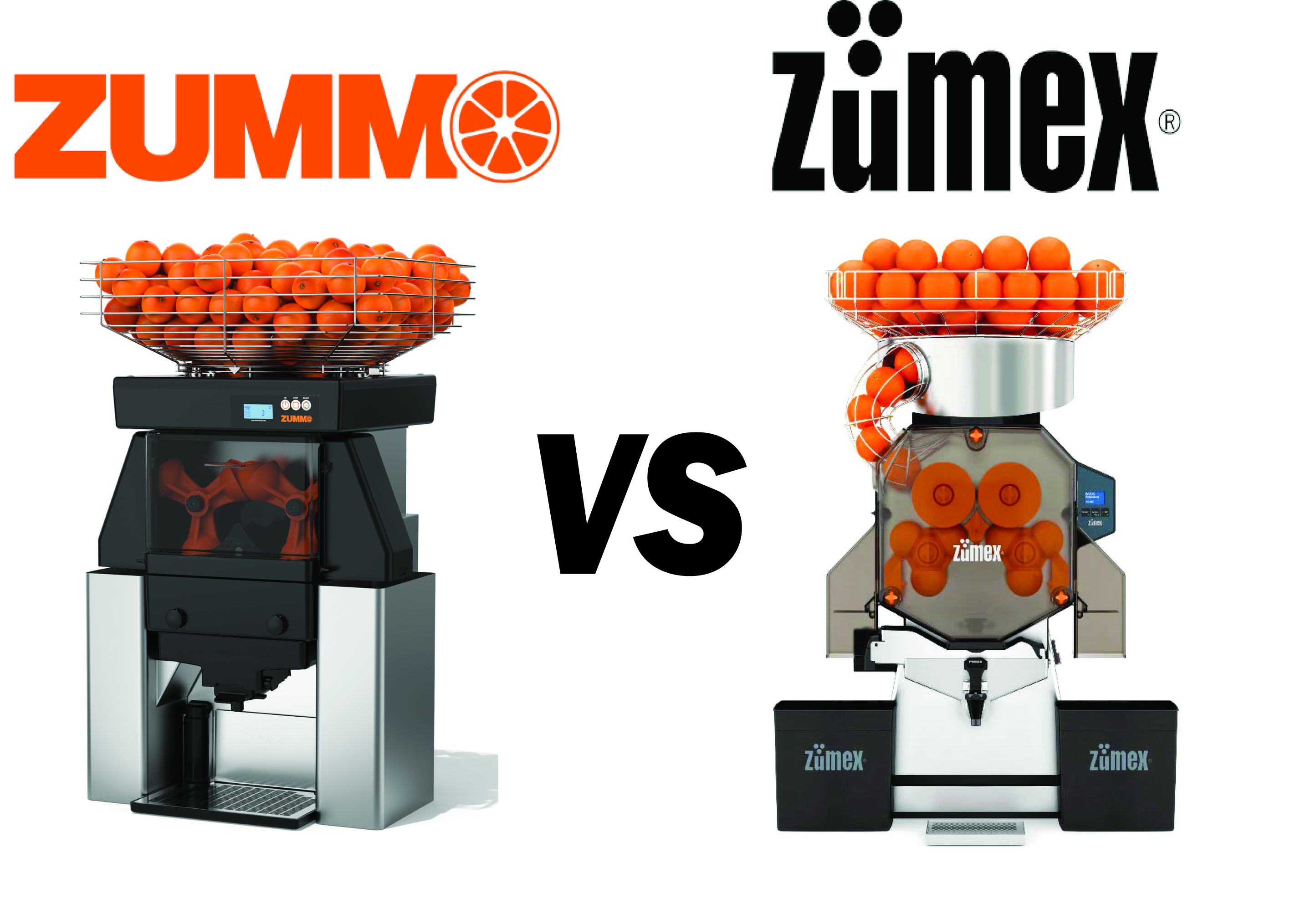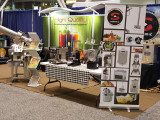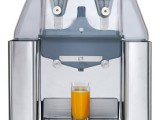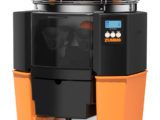Types Of Commercial Juicers: Pros and Cons
by Ryan
If you are starting a juice bar or are a restaurant looking to get a juicer but you aren’t sure what kind to get, then you have come to the right place.
We have been selling commercial juicers for over 20 years, so we know all the different types and which juicers work best for each situation.
Let’s get started.
Citrus Juicers
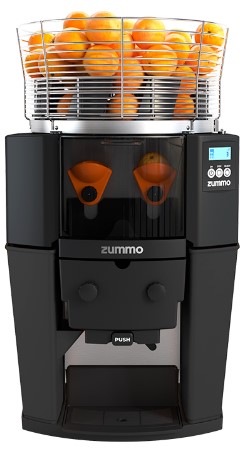
Topping off the list, we have citrus juicers. As you can probably guess from the name, these machines are made to juice citrus fruits.
Most of them can juice oranges, lemons, limes grapefruits and pomegranates. There are a few models that only do oranges though.
These machines are usually found in restaurants, hotels, catering and other locations. There are also some companies that use them for bottling juice as well.
These juicers come in all shapes and sizes. There are smaller ones that fit on a countertop and larger ones that can go on a countertop of on a cabinet with wheels and other accessories that make them more portable and saves counterspace.
There are also juicers made for lower juice demand situations that can juice about 6 fruits per minute all the way up to 40 per minute, depending on your needs.
Some machines are specifically designed to juice certain kinds of fruit, too. For example, the Zumex Speed S Pomegranate is calibrated to juice pomegranates which have tougher skins and fruit on the inside. This machine will also get more juice out of each pomegranate than a regular citrus juice machine.
There is also the Zummo LM that is calibrated to juice lemons and limes.
If you are looking to juice citrus fruits, then one of these juicers is the way to go.
Pros
- Ideal for citrus fruit
- Great for restaurants and catering
- Most machines can juice all forms of citrus fruits
Cons
- Can only juice citrus fruits
Related: Best Commercial Citrus Juicers For Restaurants and Juice Bars
Centrifugal Juicers
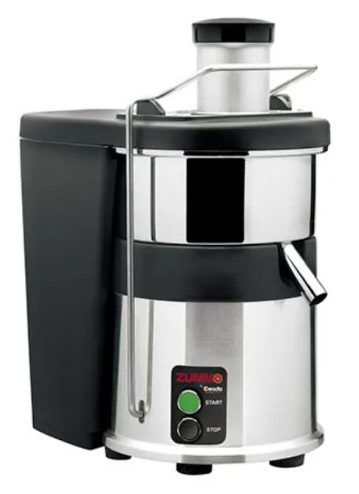
If you want to juice apples, pears, carrots, cucumbers, and just about everything else under the sun, then a centrifugal juicer could be a good option for you.
A centrifugal works by shredding fruits and vegetables using a rapidly spinning metal blade against a mesh filter, separating juice from pulp through centrifugal force which forces the juice outward into a container.
The remaining pulp is pushed to the sides and collected in a separate bin for disposal.
Centrifugal juicers are smaller, fit easily on the countertop, and are easy to operate. If you have a restaurant or juice bar, these can definitely come in handy, but they aren’t made for massive amounts of juicing; they simply aren’t fast enough.
The good news is they are the least expensive way to go for a commercial juicer so they are great for people just starting out and people with low juice demand.
Pros
- Less expensive
- Can juice a variety of fruits and vegetables
- Smaller footprint
- Easy to operate
Cons
- Citrus fruits must be peeled to be juiced
- Can’t do a large volume of juice
- Juice from a centrifugal juicer doesn’t store well
Related: Best Vegetable Juicers For Restaurants
Cold Press Machines
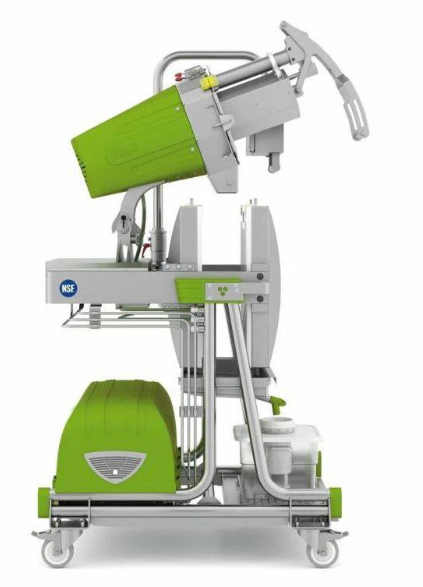
Cold press machines are sometimes referred to as masticating juicers. They are similar but not exactly the same.
A cold press is a simple and effective way to juice all forms of fruits and vegetables.
The cold press works by putting shredded fruits and vegetables into a bag and then smooshing the bag with a hydraulic press a few times to get all of the juice out.
This method delivers a high yield and gives you a wide variety of options for juice. Cold presses come in many different sizes, from countertop presses that can juice 5-10 gallons an hour to industrial presses that can juice 2000 gallons per hour.
These are great machines, but the big negative of these is that they can get pretty expensive.
Pros
- Can juice all forms of fruits and vegetables
- Has a high-yield
- It can come in countertop sizes up to industrial.
Cons
- Higher price tag
Manual Juicers
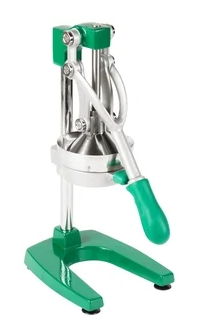
I get it; you’re just starting out and don’t have the money for a commercial juicer. If that is the case, a manual juicer will do the trick until you get your feet under you.
Most of the manual juicers out there are citrus juicers, so you will be limited in that kind of juice you will be able to produce.
The manual juicers are generally slower and are obviously operated manually, so if you get busy, it could be a lot of work.
That said, these juicers are dirt cheap. You can get an El Cheapo model for about $10 or up to about $500.
While manual juicers have drawbacks, they can work for those who do a limited amount of juicing or are new to juicing.
Pros
- Less expensive
- Can juice all forms of citrus fruit
Cons
- Only for low-volume
- Not good for fruits other than citrus
Wrap Up
There you have the 4 types of juicers for a commercial setting.
Which is best for you? That really depends on your needs, what types of fruits and vegetables you are looking to juice, and, of course, your budget.
If you have a higher demand but don’t want something better than a manual juicer, then a high-quality refurbished juicer is a consideration. They are usually about half the price of new juicers, so that can save you some good money and everyone like that.


